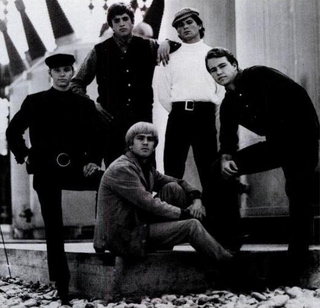
The Electric Prunes are an American psychedelic rock band, formed in Los Angeles, California, in 1965. Much of the band's music was, as music historian Richie Unterberger described it, possessed of "an eerie and sometimes anguished ambiance." Their most successful material was by songwriters Annette Tucker and Nancie Mantz, though the group also penned their own songs. Incorporating psychedelia and elements of embryonic electronic rock, the band's sound was marked by innovative recording techniques with fuzz-toned guitars and oscillating sound effects. In addition, guitarist Ken Williams' and singer James Lowe's concept of "free-form garage music" provided the band with a richer sonic palette and exploratory lyrical structure than many of their contemporaries.
Episode Six were an English rock band formed in Harrow, London in 1965. The band did not have commercial success in the UK, releasing nine singles that all failed to chart, but they did find minor success in Beirut at the time. Group members Ian Gillan and Roger Glover left in 1969 to join Deep Purple, while drummer Mick Underwood founded Quatermass and later collaborated with Gillan.

The Music Machine was an American rock band formed in Los Angeles, California in 1966. Fronted by chief songwriter and lead vocalist Sean Bonniwell, the band cultivated a dark and rebellious image reflected in their musical approach. Sometimes the band made use of distorted guitar lines and hallucinogenic organ parts, punctuated by Bonniwell's distinctively throaty vocals.
John Nicholas Shakespeare, known as John Carter, is an English singer, songwriter, and record producer.

"Heart of Stone" is a song by the English rock band the Rolling Stones, credited to the songwriting partnership of Jagger/Richards. London Records first issued it as a single in the United States in December 1964. The song was subsequently included on The Rolling Stones, Now! and Out of Our Heads.

The Rose Garden is the self-titled and only album from the American folk rock group of the same name. It was released in April 1968 on Atco Records and included their Top 20 hit "Next Plane to London".
The Rose Garden was an American folk rock band from Los Angeles, California, United States, active in 1967 and 1968. They are best remembered for their hit single "Next Plane to London".
"Stop Messin' Round" is a song first recorded by English blues rock group Fleetwood Mac in 1968. It was written by the group's principal guitarist and singer Peter Green, with an additional credit for manager C.G. Adams. The song is an upbeat 12-bar blues shuffle and is representative of the group's early repertoire of conventional electric blues. The lyrics deal with the common blues theme of the unfaithful lover and share elements with earlier songs.
Tinkerbells Fairydust were a British pop group in the late 1960s, who hailed from east London. They recorded three singles and one album for the Decca label.

The Nightcrawlers were an American garage rock band formed in Daytona Beach, Florida in 1965.
Butch Engle & the Styx was an American rock band formed in 1963 in Mill Valley, California. Originally named The Showmen, the members were Butch Engle (vocals), Bob Zamora, Mike Pardee (organ), Harry "Happiness" Smith (bass), and Rich Morrison (drums). The band released three singles before breaking up in 1968. A compilation album featuring all of the band's recordings, No Matter What You Say: The Best of Butch Engle & the Styx, was released in 2000.
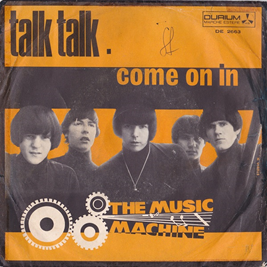
"Talk Talk" is the debut single of American garage rock band the Music Machine. It was released in November 1966, and produced the band's only Top 20 hit on the Billboard Hot 100. The song was included on their debut album, (Turn On) The Music Machine.
Wimple Winch was an English psychedelic pop band that evolved from the group, Just Four Men. Originally a Merseybeat act, their individualized sound was personalized by their intricate vocal harmonies and exploratory lyrics.

Apple Pie Motherhood Band was an American psychedelic rock band formed in Boston, Massachusetts, in 1967. One of the several groups involved in the "Bosstown Sound", a commercial ploy designed to compete with the San Francisco Sound, the band developed a blend of psychedelia, blues rock, and hard rock, which was exemplified and expanded upon on their two albums. The group went through several line-up changes before disbanding in 1970.
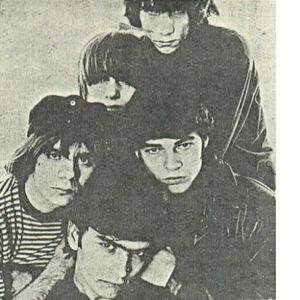
The Groupies were an American garage rock-psychedelic rock band from New York City who were active in the 1960s and are known for an innovative approach to primal blues-based rock exemplified in such songs as "Primitive". They were a popular fixture in the New York club scene and recorded for Atco Records, later venturing to Los Angeles. Due to their uncompromising stance the Groupies failed to attract a wider audience outside of their local enclaves. They have come to the attention of garage rock and psychedelic enthusiasts and their work has been included on various compilations such as the 1998 Nuggets four-CD box set, which was released on Rhino Records. Their material has been re-issued on other garage rock and psychedelic compilations such as the Pebbles, Volume 10 LP.

The Enfields were an American garage rock and psychedelic band from Wilmington, Delaware who were active in the 1960s. They were led by guitarist and songwriter Ted Munda, and their style was highly influenced by the British Invasion and folk rock. They were considered the top group in Wilmington at the time and enjoyed several local hits, though they failed to reach a wider national audience due to poor management. The Enfields broke up in 1967, but Munda went on to form the group the Friends of the Family. Ted was also in the Blues Magoos, wrote for various Publishing companies in LA, was signed to Columbia Records in 1973 with group" Hotspur", and co-wrote "Blame It On Love" for Smokey Robinson in 1983–84 on Motown. He has several albums of unreleased produced material.
The Flies, also known as No Flies on Us, were an English psychedelic pop band formed in Wanstead, East London in 1965. Releasing three singles during their recording career, the group is best-remembered for a cover version of "(I'm Not Your) Stepping Stone". Although the Flies' rendition of the song was not too commercially successful, it, along with the band's other material, has since received notice as a result of "(I'm Not Your) Stepping Stone"'s appearance on the early psychedelic compilation album Chocolate Soup for Diabetics, Volume 1.
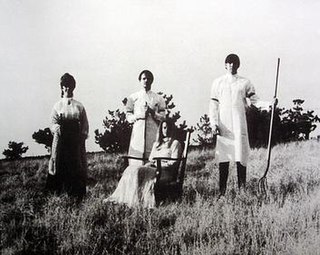
Music Emporium was an American psychedelic rock band formed in Los Angeles, California, in 1967. Fronted by experimental multi-instrumentalist Bill "Casey" Cosby, the group was created at UCLA, and developed a sound centered around Cosby's keyboards and vocal harmonies. Music Emporium released one ultra-rare self-titled album in 1969, which is praised among psychedelic enthusiasts and has been re-released multiple times.
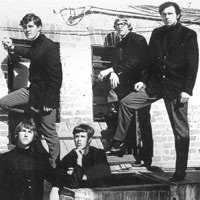
The E-Types were an American garage rock band formed in Salinas, California, in 1965. The group's sound combined striking three-part vocal harmonies and Jody Wence's jangling keyboards, with professional production techniques that were outside of the garage band norm. During the E-Types' recording career, the band released five singles, including their most notable record "Put the Clock Back on the Wall". Although the band was short-lived, the E-Types had a profound presence in San Francisco's live scene and, years after their disbandment, the group recorded a reunion album.

"Nowadays Clancy Can't Even Sing" is a song by the Canadian-American folk rock band Buffalo Springfield, released as the group's debut single in August 1966. Neil Young wrote the song in Yorkville in 1965 shortly after returning from a series of performances in Toronto, during a period when his bid at a solo career had been met with little positive response. The lyrics reflect metaphorically on Young's frustration toward his stalled career in music, and was inspired by Ross "Clancy" Smith, an aberrant classmate who incited awe in his school. Commentators recognize "Nowadays Clancy Can't Even Sing" as one of Buffalo Springfield's signature songs, as well as a milestone in Young's progression as a songwriter.












